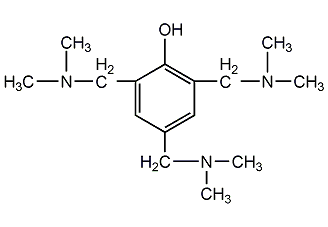
Structural formula
| Business number | 022N |
|---|---|
| Molecular formula | C15H27N3O |
| Molecular weight | 265.39 |
| label |
Tris(dimethylaminomethyl)phenol, 2,4,6-Tris(dimethylaminomethyl)phenol, DMP-30, epon accelerator, DMP-30, K-54, Hardener, accelerator, Anti-aging agent |
Numbering system
CAS number:90-72-2
MDL number:MFCD00008330
EINECS number:202-013-9
RTECS number:SN3500000
BRN number:795751
PubChem number:24900319
Physical property data
1. Properties: Colorless or light yellow to light red transparent viscous liquid
2. Density (g/mL, 20℃): 0.972~0.978
3. Relative vapor density (g/mL, air=1): Undetermined
4. Melting point (ºC) Undetermined
5. Boiling point (ºC, normal pressure): 250
6. Boiling point (ºC, 133.3Pa): 130~135
7. Refractive index: 1.5162
p>
8. Flash point (ºC): 155
9. Specific rotation (º): Undetermined
10. Autoignition point or ignition temperature (ºC) : Undetermined
11. Vapor pressure (kPa, 25ºC): Undetermined
12. Saturated vapor pressure (kPa, 60ºC): Undetermined
13 . Heat of combustion (KJ/mol): Undetermined
14. Critical temperature (ºC): Undetermined
15. Critical pressure (KPa): Undetermined
16. The logarithmic value of the oil-water (octanol/water) partition coefficient: Undetermined
17. The upper limit of explosion (%, V/V): Undetermined
18. Explosion Lower limit (%, V/V): Undetermined
19. Solubility: Soluble in organic solvents such as alcohol, benzene, acetone and cold water, slightly soluble in hot water.
Toxicological data
None
Ecological data
None
Molecular structure data
1. Molar refractive index: 81.84
2. Molar volume (cm3/mol): 257.5
3. Isotonic specific volume (90.2K): 648.4
4. Surface tension (dyne/cm): 40.1
5. Polarizability (10-24cm3): 32.44
Compute chemical data
1. Reference value for hydrophobic parameter calculation (XlogP): 1.1
2. Number of hydrogen bond donors: 1
3. Number of hydrogen bond acceptors: 4
4. Number of rotatable chemical bonds: 6
5. Number of tautomers: 2
6. Topological molecule polar surface area 30
7. Number of heavy atoms: 19
8. Surface charge: 0
9. Complexity: 236
10. Number of isotope atoms: 0
11. Determine the number of atomic stereocenters: 0
12. Uncertain number of atomic stereocenters: 0
13. Determine the number of chemical bond stereocenters: 0
14. Number of uncertain chemical bond stereocenters: 0
15. Number of covalent bond units: 1
Properties and stability
It is flammable and has an ammonia odor.
This product has low toxicity. Its vapor is irritating to the skin. Operators should wear protective equipment. After contact with skin, rinse with water. For protection, refer to general amine compounds.
Storage method
This product should be kept sealed.
Packaged in galvanized iron barrels, net weight per barrel is 50kg, 100kg, 200kg. Store in a cool, dry and ventilated place. Store and transport according to general flammable chemical regulations. It cannot be mixed with acidic, edible and other chemical products, and should be sealed and stored to prevent moisture absorption.
Synthesis method
Add phenol and 40% dimethylamine aqueous solution to the reaction kettle, stir and mix evenly, cool to below 20°C, slowly add 30% formaldehyde aqueous solution while stirring, and control to complete the addition below 30°C. Continue stirring at 25-30°C for 1 hour, then raise the temperature to 90-95°C and reflux for 2 hours. Add salt to separate the water phase, and separate the oil layer for fractionation under reduced pressure to obtain the finished product. Industrial product content is over 95%.

Purpose
This catalyst is a polyisocyanurate (PIR) reaction catalyst. Its catalytic selectivity for PIR reaction is higher than that of PUR, so it is mostly used in the formulation of polyisocyanurate reaction. Its characteristics can help the foaming rising curve become regular and have good fluidity. It is suitable for the injection molding reaction of polyisocyanurate. This product is a weakly active catalyst and is used in large amounts in the formula. It has mild reaction, stable rise, and good fluidity. The obtained products have PIR high temperature resistance and flame resistance effects. Can be used to prepare combination materials. This product is used as a curing agent and accelerator for epoxy resin. Its molecular structure contains phenolic hydroxyl groups, which increases its activity and can be used for rapid curing. However, it has a short service life and is mainly used for adhesives. This product can be used as an accelerator for acid anhydride curing agents in cast and laminated products. The amount used as a curing agent is generally 10 parts, and the amount used as an accelerator is generally 0.1 to 3 parts. Applicable curing agents: amines, acid anhydrides, low molecular weight polyamide curing agents. Used as an antioxidant and also used in dye preparation. Used as a curing agent for thermosetting epoxy resin and a curing accelerator for other resins, as well as a curing agent for ship bottom coatings and architectural coatings, the reference dosage is 0.1 to 3 parts (mass parts ). Also used as sealant, adhesive, acid neutralizer for laminate materials and flooring. Used as a catalyst in the synthesis of polyurethane.

 微信扫一扫打赏
微信扫一扫打赏

